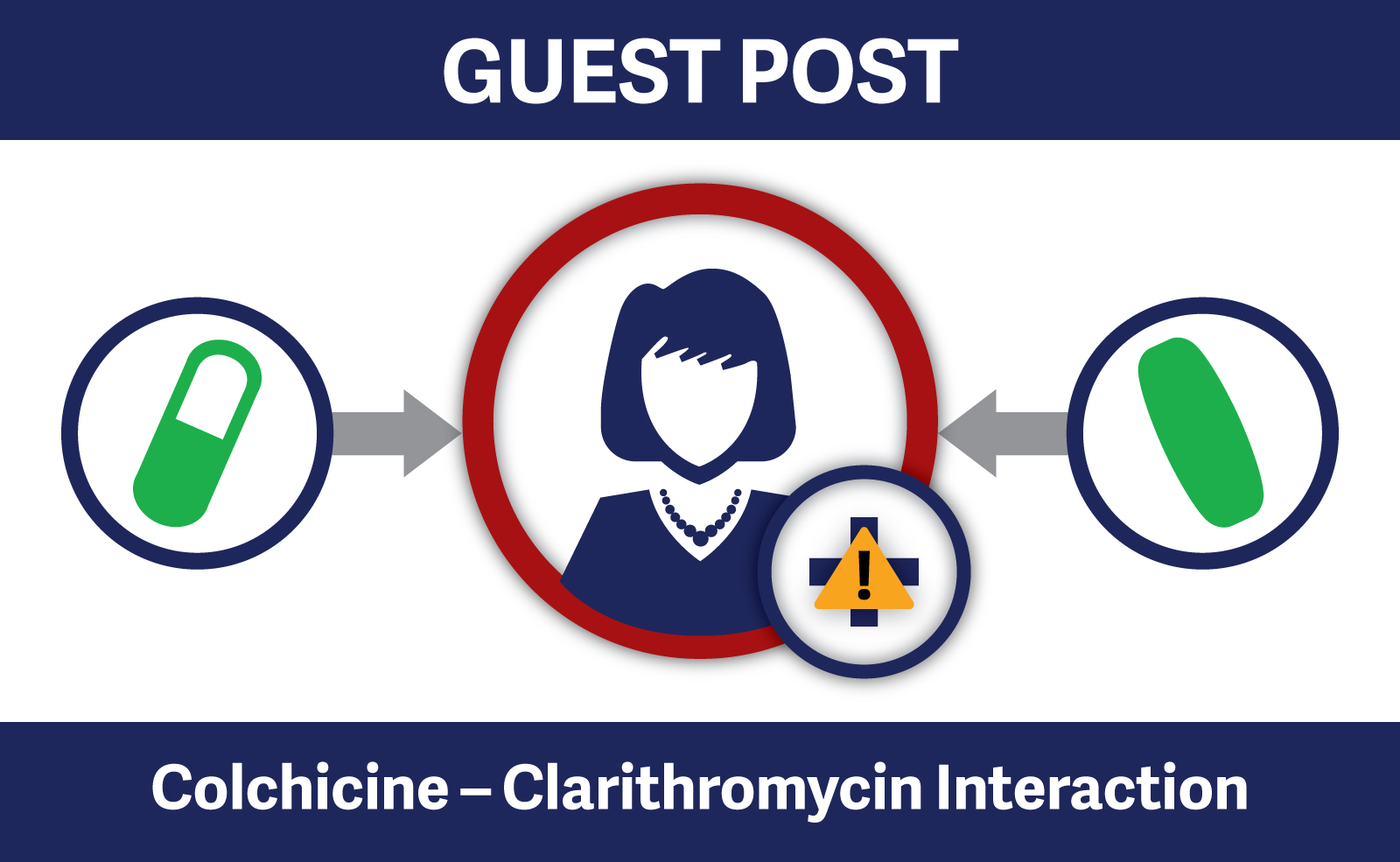Guest Post: Colchicine - Clarithromycin Interaction
Did you know that the combination of clarithromycin and colchicine can cause serious adverse events such as rhabdomyolysis, pancytopenia and even death? Even though concomitant prescribing of the two drugs prompts the highest level of drug interaction severity, “major” or “severe”, in all major pharmacy software programs, patients are still being dispensed this combination. Clarithromycin inhibits CYP 3A4 and p-glycoproteins which causes an increase in colchicine concentrations.
There are several case reports and a retrospective case-control study that have shown mortality rates as high as 10.2% when the two are used concomitantly and 3.6% when used sequentially.1 Other adverse events that were reported include: hypotension, diffuse myalgia, vomiting, diarrhea, pancytopenia, and rhabdomyolysis.1-8 The dose of colchicine that was reported ranged from 1.0-1.5mg/day in divided doses.
Patients who are at increased risk of experiencing toxicity include patients with renal impairment, liver impairment, and those who are receiving other interacting medications. The frequency of drug-related hospitalizations has been shown to be 24.1%, with 72.1% being deemed preventable.9
As a result, it is important to consider how short course medications may adversely interact with chronic medications. When treating patients on colchicine with upper respiratory tract infections, prescribers should look to alternatives to clarithromycin such as azithromycin, doxycycline, and amoxicillin. For the treatment of Helicobacter pylori in patients on colchicine, alternative regimens such as bismuth quadruple therapy should be considered.
References:
- Hung I, Wu A, Cheung V et al. Fatal interaction between clarithromycin and colchicine in patients with renal insufficiency: a retrospective study. Clinical Infectious Diseases. (2005). 41:291-300.
- Celebi ZK, Arturk S, et al. Colchicine-induced rhabdomyolysis following a concomitant use of clarithromycin in a hemodialysis patient with familial Mediterranean fever. Clin Kidney J (2013) 6: 665–666
- Cheng VC, Ho PL, and Yuen KY. Two probable cases of serious drug interaction between clarithromycin and colchicine. Southern Medical Journal. (2005) 98:8, 811-13.
- Colchicine-clarithromycin-induced rhabdomyolysis in Familial Mediterranean Fever patients under treatment for Helicobacter pylori. Rheumatol Int (2015) 35:1937–1941
- Kim J, Kim S, Lee S, et al. Colchicine-induced rhabdomyolysis caused by interaction with clarithromycin in a patient with Behcet disease. Journal of Clin Rheumatology. (2013) 19:2,108-9.
- McKinnell J, and Tayek JA. Short term treatment with clarithromycin resulting in colchicine-induced rhabdomyolysis. Journal of Clinical Rheumatology. (2009) 15:6,303-5.
- Rollot F, Pajot O, Chauvelot-Moachon L et al. Acute colchicine intoxication during clarithromycin administration. Ann Pharmacother (2004) 38:2074-7.
- Van der Velden W, Huussen J, Ter Laak H, et al. Colchicine-induced neuromyopathy in a patient with chronic renal failure: the role of clarithromycin. Netherlands Journal of Medicine. (2008) 66:3,204-6.
- Samoy LJ, Zed PJ, Wilbur K et al. Drug-Related Hospitalizations in a Tertiary Care Internal Medicine Service of a Canadian Hospital: A Prospective Study. Pharmacotherapy. (2006) 26(11):1178-86.

Dr. Karen Dahri BSc, BSc (Pharm), PharmD
ACPR Clinical Pharmacotherapeutic & Research Specialist,
Internal Medicine Pharmaceutical Sciences Clinical Services Unit, Vancouver General Hospital
Assistant Professor (Partner), Faculty of Pharmaceutical Sciences University of British Columbia
Dr. Karen Dahri is a clinical pharmacy specialist in Internal Medicine at Vancouver General Hospital and an an Assistant Professor (Partner) with the Faculty of Pharmaceutical Sciences at the University of British Columbia (UBC). She completed a Bachelor of Science in Pharmacy at the University of British Columbia (UBC) in 2000, a Hospital Pharmacy Practice Residency at St. Paul’s Hospital in Vancouver, British Columbia in 2002 and obtained her Doctor of Pharmacy at UBC in 2007. Dr. Dahri’s current research is focused on determining which pharmacist interventions provide the greatest benefits to patients and the healthcare system. And what tools and training would best enable clinical pharmacists to provide optimal care for their patients and ease transitions of care for patients.

Penny Tam MD FRCPC
Clinical Assistant Professor, UBC Department of Medicine
General Internist, Vancouver General Hospital
Penny Tam is a Clinical Assistant Professor at the University of British Columbia and works as a General Internist at Vancouver General Hospital. She completed medical school at Queen’s University and her post-graduate training at the University of British Columbia.
Dr. Tam completed additional training in Quality and Patient safety through the University of Toronto’s Patient Safety Certificate course and Intermountain Health’s mini-Advanced Training Program in Health Care Delivery Improvement. She is the Medical Director for Quality on Acute Medicine at Vancouver General Hospital and sits on the VGH Clinical Teaching Unit Quality Improvement Committee, Vancouver Acute Quality and Patient Safety Council, and Vancouver Coastal Health Choosing Wisely Steering Committee.

Laura Beresford B.Sc. (Pharm)
Graduate Doctor of Pharmacy Student, Faculty of Pharmaceutical Sciences, University of British Columbia
Laura completed her B.Sc. (Pharm) at Memorial University of Newfoundland and Labrador in 2015. She is currently in her second year of the Graduate Doctor of Pharmacy program at the University of British Columbia.
- Guest Post, adverse drug reaction


 Share
Share



